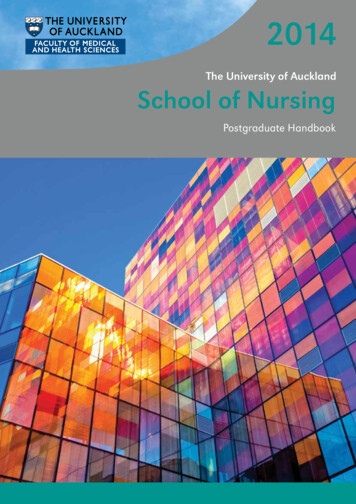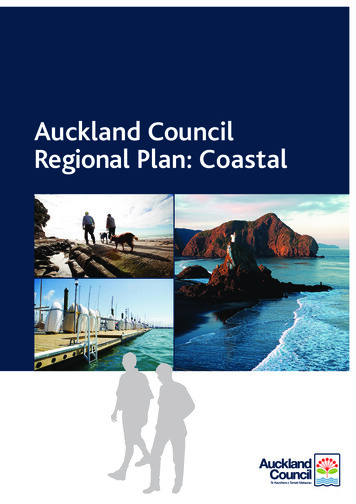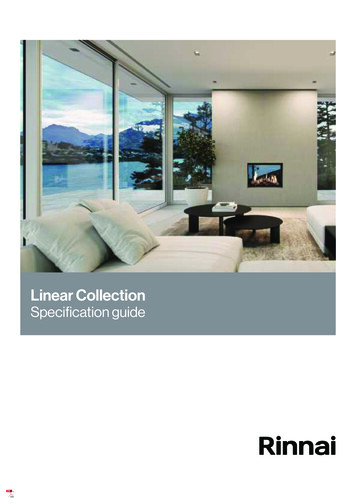
Transcription
2014The University of AucklandSchool of NursingPostgraduate Handbook
Welcome to the School of NursingThe School of Nursing is now well established back on site at the GraftonCampus. We are located on the second floor and we are pleased to be a veryproductive School within the highly successful Faculty of Medical and HealthSciences.Following The 2012 School Review we are now in the implementation phase in response to the recommendationsmade by the international review panel. This process will ensure that the School of Nursing continues to providethe most relevant and up to date education possible for our students. We will also continue to develop ourresearch strengths.The school will continue the ongoing development of our specialty clinical pathways and the courses included toensure their excellence and relevance in preparing nurses for high quality healthcare in the areas that best servethe health of New Zealanders. Our commitment to offering postgraduate study for nurses is enhanced by ourstrong strategic relationships with our clinical partners, both urban and regional.We hope that you will find your study with us rewarding and relevant and we are committed to ongoingrelationships with our students that ensure we continue to develop nursing practice and improve healthoutcomes.Feel free to visit us on Level 2.Associate Professor Judy KilpatrickHead, School of NursingContentsAbout the School of Nursing. 3Staff . 4Contacts. 6Research activities in the School of Nursing. 7About our postgraduate programmes. 9Postgraduate nursing qualifications. 11Specialty pathways. 14Clinical pathway for Nurse Practitioner. 15Schedules and prescriptions. 16Important dates. 17Nursing course descriptions 2014. 18Multidisciplinary course descriptions 2014. 23Admission and enrolment - new students. 25Fees and funding. 26Postgraduate nursing resources. 27The University of Auckland resources and facilities. 28Postgraduate programme planner. 31How to apply and enrol online. Back coverDisclaimerAlthough every reasonable effort is made to ensure accuracy, the information in this document is provided as a general guide only for students and issubject to alteration. All students enrolling at The University of Auckland must consult its official document, The University of Auckland Calendar 2014,to ensure that they are aware of and comply with all regulations, requirements and policies.2 2014 School of Nursing Handbook
About the School of NursingThe School of Nursing was established in 2000 to foster clinical learning within a multidisciplinary environment. The school contributes to the facultyvision of improving the health of communities through excellence in the development of the next generation of health care leaders, educators,researchers and clinicians.The School of Nursing, Master of Nursing programme was the first in New Zealand to be approved by the Nursing Council as educational preparationfor nurses applying for registration as Nurse Practitioner with prescribing.The School of Nursing offers the following programmes: Bachelor of Nursing – BNurs Bachelor of Nursing (Honours)–BNurs (Hons) Postgraduate Certificate in Health Sciences - PGCertHSc Postgraduate Diploma in Health Sciences - PGDipHSc Master of Health Science–MHSc Master of Nursing–MNurs Doctor of Philosophy–Nursing–PhDThe model of postgraduate education offered by the School of Nursing is uniquein the way that it works in partnership with clinical areas to provide a highstandard of academic programmes; this is facilitated through strategic links withclinical teaching facilities. Leadership for the academic programmes is providedby senior academic staff. The school has successfully attracted highly qualifiedacademic staff with strong clinical links, which ensures programmes areclinically focused and current. In addition, some of the academic staff hold dualappointments as clinical practitioners; and clinicians hold honorary positions inthe school and teach our students. The location of the school, within the Facultyof Medical and Health Sciences, provides opportunities for multidisciplinaryteaching and is a key strength of our programmes. Postgraduate teachingbenefits directly from, and is strongly underpinned by, the research andpractice-based consultancies that the staff members are engaged in.The School of Nursing Postgraduate Handbook, which includes course schedules and prescriptions, is intended as an introductory guide for studentsand staff regarding the postgraduate programmes that are offered. It should be supplemented with the following publications: The University of Auckland Calendar 2014. The Faculty of Medical and Health Sciences Postgraduate Prospectus 2014. The University of Auckland Statute and Guidelines for the Degree of Doctor of Philosophy 2011 Handbook.Please view this handbook on the website: www.fmhs.auckland.ac.nz/son/postgradThe links given will take you directly to the website of the areas you are investigating.2014 School of Nursing Handbook 3
StaffHead of SchoolProfessional Teaching FellowsJudy Kilpatrick, CNZM, BA, FCNA (NZ), RN2011 Gemma Aburn, BNurs (Hons), RNSchool Manager-School of NursingAlison Gray2006 Michelle Adams, BHSci E.Cowan, MA Portsmouth, RN2009 Joanne Agnew, PGdipHSc, MNurs PGDipHSc, RN2008 Cathleen Aspinall, MSc UCLAN, RNProfessors2007 Jane Barrington, BHSc, MHSc, RN2009 Merryn Gott, MA Oxon, PhD Sheff2000 Matthew Parsons, BSc (Hons) MSc PhD Lond., RN2005 Mia Carroll, BA Massey, DPH, MHSc FCNA (NZ), RNAssociate Professors2007 Michael Crossan, BNS (Hons) MSc UC Dublin, RN1993 Robyn Dixon, MA PhD, RN2009 Andrew Jull, PhD, MA (Appl),Dip BusStudies (Health Mgmt), RN1999 Judy A. Kilpatrick, CNZM, BA, FCNA (NZ), RN1999 Nicolette Sheridan, PhD,MPH,DipOHP Otago, DipTT, RNSenior Lecturers2011 Louise Carrucan-Wood, BNurs, MHSc (Hons), RN2005 Lesley Doughty, BHSc Auck.UT, MEd, RN2007 Stacey McLachlan, MNurs (Hons), BHSc Manukau.IT, PGDipHSc, RN2009 Sandra Oster, BN Winona State, MSN Minn.State, RN2003 Reena Patel, BHSc Auck.UT, MN PGDipHealInf Otago2007 Karyn Scott, BHSc Auck.UT, MHSc (Hons), RN2007 Kathy Shaw, MHSc Auck.UT, RN2000 Heather Baker, BA PGDipSocSci Massey, MA, RN, RM2008 Deb Somerville, MNurs, RN2011 Michal Boyd, ND University of Colorado,NP, RN2005 Lisa Stewart, BA, MNurs, RN2008 Terryann Clark, PhD Minn State, MPH (Hons), RN2011 Kim Ward, PGDipHSc, RN2013 Clare Gardiner, BSc(Hons) Sheff, PhD Sheff2010 Michele Yeoman, PGDipHSc, RN2001 Helen Hamer, MN Massey, PhD, RN2006 Karen Hoare, MSc Northumbria, PhD Monash, NP, RN, RHV, RGN,RSCN (UK)2001 Michelle Honey, PhD, MPhil Massey, BASocSci, RN2009 Stephen Jacobs, BA, DipTchg, PhD2007 Jacquie Kidd, PhD, MN Otago Polytech, RN2002 Anecita Gigi Lim BScN Bohol, Philippines, DipSocSc Massey,GradDipSc, MHSc, FCNA (NZ), PhD, RN2002 Dianne Marshall, BASocSci MA Massey, RN2002 Ann McKillop, BA, MA Massey, DN Technol.Syd, FCNA (NZ),RNResearch Fellows2010 Rosemary Frey, MSc, PhD UWI2004 Katey Thom, PhD, MA Cant.Honorary ProfessorChristine Ingleton, BEd Manc, MA Leeds, PhD Sheff, RNHonorary Associate Professors1999 Margaret P. Horsburgh, EdD C.Sturt., MA DipEd, FCNA (NZ), RN, RM1997 Anthony O’Brien, BA MPhil Massey, FNZCMHN, RNHonorary Senior Lecturers2001 John Parsons, BSc (Hons) Brun., PGDipHSc Auck.UT, MHSc, PhDSusan Bramah Adams, MSc, RHV, RN2011 Kathy Peri, MHSc Otago, PhD, RNKerry-Ann Adlam, MN,RN2008 Kate Prebble PhD, MHSc, BA, RNSusan Aitkenhead, PGDip Pal Care Glas, MSC Edin, RN2013 Julia Slark, PhD, RNMargareth Broodkorn, MNurs, RN2002 Susan Waterworth, MPhil Liv., MSc DANS Manc., RNTaima Campbell, BN Waik., MHSc, RNLecturers2001 Barbara Daly, BSc, MHSc, RN2007 Anna King, PhD, BNurs (Hons), RN2005 Deborah Rowe, PhD, BHSc DipNurs Auck.UT., PGDipBus, MMgt,MHSc, PGDipBus, RNAndrew Cashin, BHSc MN PhD DipAppSci Technol.Syd., RN, MHN, NPMaree Cassidy, PGDipHSc, RNAlex Craig, MN Massey, RNLyn Dyson, MA, Massey, RNDenise Kivell, MHSc, RNJan Nichols, MPH, RNDi Roud, MHSc Auck.UT, RN4 2014 School of Nursing Handbook
Honorary LecturersHonorary Clinical Associate ProfessorGareth Edwards, MSc, Aberd2010 Amanda Wheeler, BSc BPharm Otago, PGDipClinPsychPharmDe Montfort, MRPharmSDeborah Harris, MHSc, NPRose Lightfoot, MPH, RNRussell Vickery, MEd (Hons), PGDipEdHonorary Clinical Senior LecturersJagpal Benipal, BHSc MBS Massey, A/FACHSE, PhD RNHonorary Professional Teaching FellowsJane Brosnahan, BN, MA Well., RN, MCNA2011 Sara Aiken, MHSc Auck UT, BHSc, RNAnnie Fogarty, BHSc Auck.UT, MA DipBusMgt Massey, RN2011 Donna Aitken, BN Otago Polytech2011 Karen Alden, BNurs, PGCert HSc, RNHonorary Clinical Lecturers2009 Pip Brown, MA, RNViv Atkins, MNurs, RN2010 Cheryl Ingram-Clark, BHSc, MHSc, RNDianne Barnhill, BN, PGCert Massey PGDip UOA, RN2010 Amanda Louise Browne, BSc C.England, RNKaryn Bycroft, MNurs, RN2010 Elizabeth Buckley, BA, MNurs, RNMargaret Colligan, MNurs, RN2010 Glenda Butturini, PGCert HSc, RNJanette Dallas, MNurs, Massey, RN2010 Jean-Michel Burgess, BSc Lond.S.Bank.Camille Davis, FNP, MSN, BSN2013 Leanne Cameron, BSc Well., MBChB OtagoLorna Davis, BA Leeds Met., MA York(UK), RN2010 Cherry Campbell, MHSc C.Sturt, RNBarbara Docherty, PGDipHSc, RN2008 Jessie Crawford, MN Massey, RGON, NPRenee Edwards, BHSc (Nsg), PGDip HSc, RN2011 Michelle Dawson, Dip (HE) C. LancsDavid Garland, PG Dip, RN2012 Mary Jo Gagan, PhD, RN, FAANPMaureen Goodman, RN. BHSc (Nursing), MN2006 Michael Geraghty, BA, MHSc, NP RMN (UK), RNDeidre Gordon, PGDipHSc, RN2013 Kirsty Greaves, RCpNDiana Hart, BA, MN, NP, RN2011 Maureen Harte, NP, MNursSamantha Heath, BSc Manc., MA Wolv., RN2010 Jo Hathaway, MA (Applied) Well., RNKarin Hoedl-Lang, PGCertHSc, RN2009 Lorraine Hetaraka, PGDip HSc, RNMaria Kekus, MN, RGN2010 Emma Jane Hill, RNJayne Mason, PG Dip HSc, RN2012 Sonia Hromadko, BN Waikato PolytechJean Mary McQueen, MN(Hons), RM(UK),RN2010 Jayne Huggard, MHSc, RNYvonne Morgan, DipHENursing E.Anglia, MHSc, RN2013 Natalie James, MA (Applied), RNKaren Schimanski, PG Cert HSc, PG Dip HSc, RGONN2008 Philippa Jones, MA DMS, MCGI, RNAdrienne Scott, BHSc Auck.UT, MN Massey, RN2011 Joyce Whye Sook Leong, MSc, BNurs, RNBarbara Smith, DipEd Massey, BA, MHSc, RN, RM2011 Brigid Aimee Mathias, PGCert HSc, BCN Otago Polytech., RNCynthia Wensley, BA PGDipHSM Massey, MHSc2011 Kiri Matiatos, PGCertHSc, RNPaula Whitfield, MNurs, RN2009 Duncan Milne, BHSc Auck.UT, MNurs, RNAnne Williamson, MHSc (Hons), BHSc Manukau IT, PGDipHSc, RN2010 Bev McClelland, MHSc, RN RMN (SA)2013 Lesley Macdonald, MSocSc Waik, RN2011 Shirley McKewen, RPN, BN Otago Polytech, MA Well2010 Carla Macmillan, PGDipHSc, RGON2013 Bhavani Peddinti, MBBS Indore2012 Joanna Peterson, MN, RN2013 Cecilia Rademeyer, MB, ChB, Stell.2011 Jacqualine Robinson, NP, RN2010 Nicky Sayers, BNurs, RN2011 Fran Storr, RGON, BHSc, MN (Hons), PGCert HSc2012 Bernice Tatton, BHSc, RN2013 Raiquel Te Puni, PGCert HSc2011 Wendy Tustin-Payne, MNurs, RN2011 Adair Watson MN (Hons), RN2014 School of Nursing Handbook 5
ContactsStudents are invited to approach the following staff for information, advice and assistance regarding the programmes outlined in this handbook.Physical location:The School of Nursing is located inBuilding 505, Level 2GerontologyAnne WilliamsonPhone: 64 9 923 6424Email:a.williamson@auckland.ac.nzGrafton Campus85 Park RoadLeadership and ManagementGraftonSusan WaterworthPhone: 64 9 923 l AddressThe School of NursingFaculty of Medical and Health SciencesThe University of AucklandPrivate Bag 92019Auckland 1142, New ZealandPhone: 64 9 923 2404 or 923 7563Fax: 64 9 367 7158Website: www.fmhs.auckland.ac.nz/sonGrafton CampusHead of School of NursingAssociate Professor Judy KilpatrickPhone: 64 9 923 2897Email:j.kilpatrick@auckland.ac.nzPostgraduate Programme DirectorDr John ParsonsPhone: 64 9 923 3935Email:j.parsons@auckland.ac.nzPhD AdviserDr Stephen JacobsPhone: 64 9 923 3975Email:s.jacobs@auckland.ac.nzMasters AdviserDr John ParsonsPhone: 64 9 923 3935Email:j.parsons@auckland.ac.nzPostgraduate Course AdviserLesley DoughtyPhone: 64 9 923 9566Email:l.doughty@auckland.ac.nzBN(Hons) AdviserDr Stephen JacobsPhone: 64 9 923 3975Email:s.jacobs@auckland.ac.nzChild and Youth HealthDr Karen HoarePhone: 64 9 923 5694Email:k.hoare@auckland.ac.nz6 2014 School of Nursing HandbookMental HealthTony O’BrienPhone: 64 9 923 5693Email:a.obrien@auckland.ac.nzNew Graduate CoursesKaryn ScottPhone: 64 9 923 4206Email:karyn.scott@auckland.ac.nzNurse Practitioner PathwaySandra OsterPhone: 64 9 923 1802E-mail: s.oster@auckland.ac.nzRegional PostgraduateCo-ordinatorsWaikato regionKathy ShawPhone:Email:027 457 5019kathy.shaw@auckland.ac.nzDr Jacquie KiddMental Health NursingPhone: 64 7 839 8899 ext 5087Email:j.kidd@auckland.ac.nzMidland regionMia CarrollPhone:Email:027 322 2270mia.carroll@xtra.co.nzTaurangaLiz BuckleyPhone:Email:07 579 r Gigi LimPhone: 64 9 923 3782Email:g.lim@auckland.ac.nzCheryl Ingram-ClarkPhone:Email:Palliative Care NursingNorthland regionJackie RobinsonPhone: 64 9 923 2883Email:j.robinson@auckland.ac.nz 64 7 348 1199 ext. 7859cheryl.Ingram-clark@lakesdhb.govt.nzAdair WatsonPrimary Health Care NursingWhangareiNorthlandPhone: 64 9 430 4101 ext e Professor Nicolette SheridanPhone: 64 9 923 7811Email:n.sheridan@auckland.ac.nzTaranaki regionPostgraduate Student ManagerRebecca WieczorekPhone: 64 9 923 2404Email:r.wieczorek@auckland.ac.nzResearch Student ManagerLee–Anne GovenderPhone: 64 9 923 1205Email:la.govender@auckland.ac.nzSchool Manager-School of NursingAlison GrayPhone: 64 9 373 7599 ext 89887Email:alison.gray@auckland.ac.nzGlenda ButturiniPhone:Email: 64 6 753 6139 ext 7783Glenda.butturini@tdhb.org.nzCounties Manukau regionDianne BarnhillPhone:Email: 64 9 923 2070Dianne.Barnhill@middlemore.co.nz
Research activitiesin the School of NursingResearch activities in the School of NursingThe Applied Ageing Research GroupThe school has a clear research strategy aimed at supporting staff andstudents in developing their research interests. Collaboration withresearchers across faculties and other universities nationally andinternationally has contributed to the growth of research within theSchool of Nursing. The school prides itself on conducting research withthe potential to impact on and inform change in the health sector andwider social care system.TThis research group undertakes research and education to improve thewellbeing of older people who access health services. Research abouthealth services for older people is used to improve the quality of healthservice and delivery by:The school has four research entities: Centre for Mental Health Research. The Applied Ageing Research Group. Palliative and End of Life Care Research Group. Nursing Education.The Centre for Mental HealthSince its creation in 2005, the Centre for Mental Health Research hasbeen responding to the growing demand for high quality research in thefield of mental health and addictions. Today, the Centre functions as ahub for researchers and teachers across the disciplines who areinterested in recovery-focused research within a social justice framework.The Centre is led by co-directors Katey Thom and Jacquie Kidd who arejoined by other academics in the School. Having a focus on translational and applied research; Assistingprimary, community, residential and secondary health sectors in thedevelopment and implementation of evidence based services;Ensuring the goals and needs of older people and their families/whanau are listened to in the development and implementation ofservices; Providing evidence based education, training and resourcesfor health professionals and others working with older people; Taking acollaborative approach toward research and consultancy; Encouragingco-ordination and collaboration between primary, community,secondary and residential care services. The research programme is organized around the themes: Rehabilitation Mental Health and older people Older people in the Community Workforce development Best practiceThe Centre has strong service user involvement, including service-userled research, and aims to work in partnership with other stakeholders toconduct and support mental health research that: Several members of The Applied Ageing Research Group are involvedin research with the Institute of Healthy Ageing, a research institutebased at Waikato District Health Board. Professor Matthew Parsonshas a joint appointment as Professor of Gerontology between TheUniversity of Auckland and Waikato DHB. Contributes to our understanding of mental health, mental illness, andaddictions and its impact on individuals, whānau and the widercommunity.Palliative and End of Life Care ResearchGroup Promotes social inclusion and reduces discrimination towards peopleexperiencing mental health problems. Facilitates effective mental health service delivery. Improves the mental health and well-being of all New Zealanders.The Palliative and End of Life Care Research Group aims to conduct highquality, multi-disciplinary research that informs practice and policy inpalliative and end of life care both nationally and internationally.Specifically the Group aims: To explore factors that enable people to ‘live well’ in the last years oftheir life and achieve a death that, where possible, is in line with theirviews and preferences. To provide evidence to underpin new models of care and supportrequired to meet the palliative care needs of ageing populations. To focus specifically upon populations who are known to be at risk ofreceiving sub-optimal care at the end of life, for example older peopleand people from minority cultural and ethnic groups. To ensure that, through education, research training and postgraduatesupervision, capacity exists within NZ to develop this research andservice development agenda.2014 School of Nursing Handbook 7
Nursing EducationCurrent studies include:Over the past decade a number of our lecturers have undertakenresearch, within the School of Nursing, that focuses on the teaching andlearning of our students both in the undergraduate and post graduateprogrammes. Palliative care development and evaluation through the Bachelor ofNursing programme. This study has attracted a 10,000 Faculty grant.The focus of the studies is to develop and evaluate educationalinnovations, in the curriculum, in teaching and in student learningprocesses.Specific studies undertaken have included: Evaluating e-learning in both postgraduate and undergraduatestudents Evaluating outcomes of reflection in the undergraduate programme Communication skill development in an undergraduate programme– an evaluation of outcome. Student learning experiences that facilitate positive interactions andexposure to actively ageing older adults who defy the traditionalstereotypes associated with being ‘old’. Practice development aligned with a postgraduate nursing course:Education in Clinical Practice. Randomised Controlled Trial (RCT) to evaluate nursing students usingwiki to learn health technology. A Faculty tracking project of the Bachelor of Nursing graduates. Thisstudy links with an e-cohort study following graduates for 3 years incollaboration with Massey University, AUT and Queensland University. Information literacy development in the Bachelor of Nursing incollaboration with librarians. A population health project working with community agencies.Outcomes for students and the agencies.Sibi Roy, masters student meeting with supervisor Dr John Parsons.8 2014 School of Nursing HandbookFurther information about current research projects, recentpublications and contact details can be found on the website linkbelow:www.fmhs.auckland.ac.nz/son/research
About our postgraduate programmesStudy at postgraduate level means making a commitment to both professional and personaldevelopment as well as to new and challenging academic work. Postgraduate study is aboutinvestigating, analysing, critically evaluating, reflecting and responding to the challenges posed bypractice and the academic environment.A major feature of postgraduate study is a requirement for self-directedlearning. This is achieved through assignments, reading, seminarpresentations and clinical practice at an advanced level. A considerablecommitment above ‘class time’ is required. While this will includepre-reading, studying and writing, participation in research seminars,writing workshops and other activities, it will also help maximise thebenefits to be gained from graduate study. The School of Nursingincorporates a range of such activities throughout the academic year.The focus for postgraduate nursing study at The University of Auckland isthe enhancement of clinical nursing practice. Postgraduate nursingcourses are concerned with enhancing clinical nursing skills, practiceknowledge and preparing nurses for clinical leadership roles together withfacilitating understanding of the current and future context of nursing andhealth care. Collaboration with clinical staff has been integral to thedevelopment of the clinically based courses and clinical staff are closelyinvolved in the delivery and teaching of these courses.Courses have been designed to take account of the rapidly changinghealth care environment where choices must be made about what can, orshould, be funded. In response to the Nursing Council approved NursePractitioner with Prescribing role, we are collaborating closely with theSchool of Pharmacy and the Department of Clinical Pharmacology. Healthpolicy, health economics, the clinical and cost-effectiveness of nursing andhealth care decisions, the structure and function of health careorganisations and the role of nurses and other health professionals allcontribute to the enhancement of nursing practice and form componentsof individual courses. Opportunities are provided for multi-disciplinarystudy together with development of skills and attributes generic topostgraduate university health professional study.Programme structures are intended to be flexible and provideopportunities for nurses to design programmes of study that areappropriate for the learning goals they wish to achieve and are relevantto their practice areas. In recognition that the nursing workforce must bedeveloped more effectively to meet the health care needs of NewZealanders, opportunities are also provided for nurses who wish toacquire the competencies defined by the Nursing Council of NewZealand (2001) for advanced nursing practice or nurse practitioner rolesand/or seek to prescribe or practice within a designated scope.Students’ expectations and responsibilitiesYou can expect: Appropriate academic advice. Relevant and current teaching. Response to questions about your studies from coordinators ofcourses. Timely assessment of assignments.You are responsible for: Enrolling and paying your fees on time. Being informed regarding class schedules, assessments and duedates. Carrying out your own library searching. Submitting assignments on time according to guidelines. Initiating administrative requirements such as change of programme. Change of personal details. Access of final grades. Applying for your qualifications to be conferred.Regional centresSome of our postgraduate courses are offered regionally in: Northland Rotorua Taranaki Tauranga WaikatoFor regional contacts please refer to pg. 6.All postgraduate nursing students must hold currentregistration with the Nursing Council of New Zealand andall students for whom English is not their first language mustprovide evidence of their English language proficiency such as:IELTS with a minimum score of 7.0, with no band less than 7.2014 School of Nursing Handbook 9
The structure of postgraduate programmesExplaining credit pointsThere are two distinct Masters qualification pathways within thepostgraduate nursing programme. Within each of these pathways thereare three possible qualification steps. These qualifications are all at apostgraduate level and each step contributes to the next step i.e. the60points of the PGCertHSc leads on to the PGDipHSc so the studentcompletes a further 60points for this qualification. Students may obtain ageneric advanced nursing qualification in health science (MHSc) or themore clinically focused advanced nursing qualification (MNurs).At The University of Auckland, 120 points equates with a full-timeacademic year. Postgraduate papers in the School of Nursing are usually30 points. One full-time semester is therefore 60 points.Eligibility for entry and progression Students must hold nursing registration, a current practisingcertificate, have had recent clinical nursing experience and either havecompleted an appropriate undergraduate degree or hold aprofessional nursing qualification to enter any postgraduate nursingprogramme. Enrolment, in the first instance, is in PGCertHSc and on completionstudents may proceed to the PGDipHSc. Following this, on attaining a grade point average of 5 (B), mayproceed to the Masters programme. When you complete a PGCertHSc (60 points), you may apply to havethe certificate conferred and exit the programme. Alternatively you may proceed to a PGDipHSc. In the same way, you may apply to have the PGDipHSc conferred andexit the programme, or may apply to enter the Masters programme. You may have a break between each component, however you mustattain a grade point average of 5 (B) in the PGDipHSc to be eligible forentry into the Masters Programme.Note:You need to access ‘student services online’ to make the necessarychange of programme to a diploma or masters.Refer to: www.studentservices.auckland.ac.nz/uoa10 2014 School of Nursing HandbookThe qualification steps are:PGCertHScAdvanced Nursing60 ptsPGCertHSc60 ptsààPGDipHScAdvanced NursingAdditional 60 ptsPGDipHScAdditional 60 ptsààMaster of NursingAdditional 120 ptsMaster ofHealth ScienceAdditional 120 ptsThe aim of both Masters programmes is the enhancement of clinicalnursing practice and leadership to reflect the advanced nursing pathwayidentified by the Nursing Council of New Zealand and supported by theMinistry of Health strategy.The Master of Nursing (approved by the Nursing Council of NewZealand) is seen as the preferred qualification for nurses wishing toenhance their clinical practice within a defined scope of practice, pavingthe way for the advanced nursing and nurse practitioner roles , includingpreparation for prescribing.The Master of Health Sciences allows nurses, working in a range ofsettings, not necessarily engaged in clinical practice, to include nursingcourses in their programme and to also select from a broader range ofcourses including multidisciplinary courses.Students may, with the permission of the Head of School of Nursing,enrol in courses outside of the Faculty of Medical and Health Sciences.All of our courses lead to qualifications thatare approved by the Nursing Council of NewZealand and therefore are eligible for fundingby Health Workforce New Zealand. Contactyour local DHB HWNZ Co-ordinator.
Postgraduate nursing qualifications Other postgraduate qualificationsPostgraduate Certificate in Health Sciences60 pointsThe PGCertHSc allows students to undertake a personal programme ofstudy selecting from a wide range of medical, nursing and health sciencecourses available at The University of Auckland.Structure/content: To obtain this certificate students must obtain 60points. Courses may include nursing courses and multidisciplinarycourses, such as those offered in Palliative Care, Gerontology, PrimaryHealth Care, Psychiatry and Behavioural Science, and other courseslisted in the Master of Health Sciences schedule in The University ofAuckland Calendar 2014.Postgraduate Diploma in Health Sciences120 pointsThe PGDipHSc allows students to undertake a personal programme ofstudy selecting from a wide range of medical, nursing and healthsciences courses available at The University of Auckland.Structure/content: To obtain this diploma students must obtain afurther 60 points. Courses may include nursing courses andmultidisciplinary courses such as those offered in Palliative Care,Education, Gerontology, Primary Health Care, Psychiatry and BehaviouralScience and other courses listed in the Master of Health Sciencesschedule in The University of Auckland Calendar 2013. Where a studentintends to proceed to a Masters programme a research methods coursemust be included. Achievement of a grade point average of 5 or higher (Bor higher) in the Postgraduate Diploma allows nurses to proceed to theMaster of Health Sciences.120 pointsThe MHSc is a more generic health professional qualification. It enablesnurses who may or may not be
6 2014 School of Nursing Handbook Contacts Students are invited to approach the following staff for information, advice and assistance regarding the programmes outlined in this handbook. Physical location: The School of Nursing is located in Building 505, Level 2 Grafton Campus 85 Park Road Grafton Auckland Postal Address The School of Nursing










